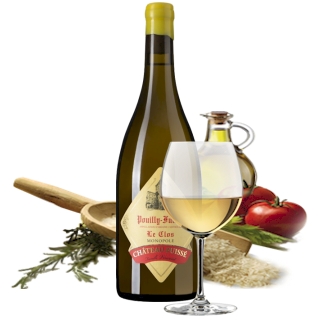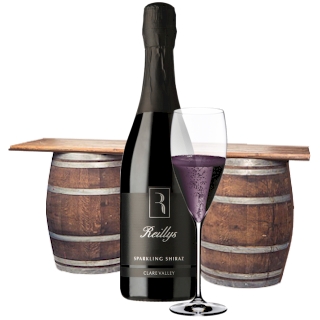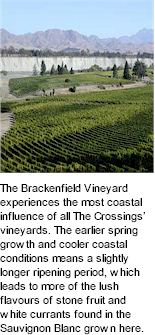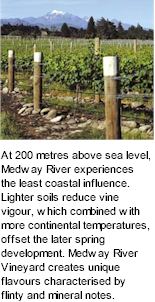


In the nineteenth century, early pioneers stopped in this valley at a place where their horses could wade across the Awatere River. They called this point The Crossings. Today, this spot falls within The Crossings wine estate, which is made up of three vineyards in strategic locations within the valley. While this land was once used by the settlers for grazing, recent years have increasingly seen it converted to vines, as this southern sub-region of Marlborough proves itself to be a prime vineyard location.

While the Awatere Valley is producing wines different in style to those of northern Marlborough, wines from The Crossings offer a particularly individual expression of the Awatere. As one of the viticultural pioneers of the valley, The Crossings have been able to select a spread of the best sites, and from the many different parcels within these, are able to create individual wines that express the land in which they are grown. At the heart of The Crossings lie 140 hectares (346 acres) of vineyards spread over three specially selected sites on the northern banks of Awatere River in Marlborough's Awatere Valley These are wholly owned by The Crossings, ensuring complete control over the grapes.
The natural profile of the Awatere Valley, with its golden staircase of river terraces provides variations in soils and temperatures at different altitudes. This means that within each of The Crossings’ vineyards themselves numerous sites exist, offering a wide variety of parcels with diverse flavour profiles from which we create our blends. This enables the crafting of well structured and individual wines, which retain an unmistakable Marlborough profile, while exuding Awatere character. The Crossings' viticultural focus is on maintaining low yields and achieving good vine balance to produce fruit that ripens uniformly and with maximum flavour intensity.
Working in harmony with nature forms the root of The Crossings’ vinegrowing programme and has directed all aspects of site preparation, planting and vineyard management. In an age where the drive to maximise production has transformed diverse ecosystems into monoculture in many of the world’s vinegrowing areas, The Crossings celebrates biodiversity, and has left many of the fine old trees and existing vegetation on our sites. The estate also avoids the use of pesticides and herbicides and follows the practices of New Zealand’s Sustainable Winegrowing programme.

The Awatere Valley is the southern sister valley of the Wairau Valley, where Marlborough's Sauvignon Blanc legacy began. As interest has grown in the Awatere, vineyard plantings have risen to around 1,200 hectares (3,000 acres), with very little prime viticultural land now left in the valley. The Awatere Valley shares many general climatic characteristics with the Wairau Valley, such as the low rainfall, high sunshine, warm summers, cool nights and long dry autumns ideal for producing high quality wines. However, bud burst for vines on lighter soils in the Awatere can be a little earlier than in the Wairau, while the region's harvest can be later, often giving Awatere grapes a longer ripening period in which to develop intense flavours.
With a relatively high water table in the Wairau Valley, the natural vigour of a vine like Sauvignon Blanc must be constantly checked in the vineyard in order for the vine to concentrate its energy on its grapes. However, the lack of underground water in the Awatere's free draining glacial outwash gravel soils, limits both the vigour and yield of its vines. This enables the vines to achieve a good balance and allows the viticulturalist greater control of vigour. The result is ripe concentrated fruit which makes wines that embody the distinctive minerally style of the Awatere.
The Brackenfield Vineyard site is composed of a low-lying river terrace and has spectacular views of the Kaikoura mountains and the surrounding countryside. This stunning vineyard is enriched by the presence of a number of mature trees, as well as some native plantings, which date from the site’s previous use in the early 1900s as a forestry trial area. The earlier spring growth and cooler coastal conditions means a slightly longer ripening period, which leads to more of the lush flavours of stone fruit and white currants found in the Sauvignon Blanc grown here.
The three river terraces which make up the Willow Flat Vineyard are flanked by the original location of the 19th century Awatere River crossing. It has similar soil profiles to those at Brackenfield, but the presence of denser, older fan outwash gravels makes it particularly suited to the production of Pinot Noir. Consequently it is here that The Crossings have planted a selection of Dijon Pinot Noir clones. Set against the dramatic backdrop of the Awatere River's white clay cliffs is The Crossings’ Medway River Vineyard. The site, which is on a northern river terrace, is immediately downstream of the convergence of the Awatere River and the tributary from which it takes its name. The combination of soil and site at the Medway River Vineyard creates unique flavours which are characterised by flinty and mineral notes.
